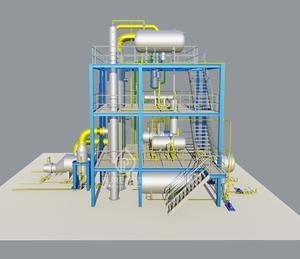Blog Information
- Posted By : qian liu
- Posted On : Nov 17, 2023
- Views : 71
- Category : General
- Description : Desulfurization, the process of removing sulfur from various substances, plays a crucial role in various industries. It is an unsung hero, ensuring the production of high-quality products, environmental protection, and human health.
Overview
Desulfurization in the Petroleum Industry
In the petroleum industry, desulfurization is essential for producing clean fuels that meet stringent environmental regulations. Sulfur compounds in crude oil can lead to the formation of sulfur oxides (SOx) when burned, contributing to acid rain and air pollution. Desulfurization processes, such as hydrodesulfurization (HDS), remove sulfur from crude oil and its derivatives, reducing SOx emissions and protecting the environment.
Desulfurization in the Steel Industry
In the steel industry, desulfurization plays a critical role in producing high-quality steel. Sulfur in steel can lead to brittleness and reduce the material's strength and durability. Desulfurization processes, such as vacuum degassing or ladle treatment, remove sulfur from molten steel, improving its properties and enhancing the quality of final products.
Desulfurization in the Natural Gas Industry
In the natural gas industry, desulfurization is essential for producing clean, pipeline-quality natural gas. Sulfur compounds in natural gas can corrode pipelines and interfere with gas processing equipment. Desulfurization processes, such as adsorption or absorption, remove sulfur from natural gas, ensuring its safe transportation and utilization.
Desulfurization in the Chemical Industry
In the chemical industry, desulfurization is crucial for producing a wide range of chemicals and pharmaceuticals. Sulfur compounds can contaminate chemicals and interfere with chemical reactions. Desulfurization processes, such as solvent extraction or oxidation, remove sulfur from various chemicals, ensuring product purity and process efficiency.
The Environmental and Health Benefits of Desulfurization
Desulfurization goes beyond mere product quality; it has significant environmental and health benefits. By removing sulfur from various substances, desulfurization contributes to:
- Reduced Air Pollution:Sulfur oxides (SOx) are major contributors to acid rain and air pollution. Desulfurization processes reduce SOx emissions, improving air quality and protecting human health.
- Enhanced Environmental Protection: Sulfur compounds can contaminate soil and water sources, harming aquatic ecosystems and terrestrial plants. Desulfurization helps protect the environment by reducing sulfur contamination.
- Improved Human Health: Sulfur compounds can cause respiratory problems and other health issues. Desulfurization processes contribute to better air quality and reduced exposure to sulfur compounds, promoting public health.
Conclusion
Desulfurization, often overlooked, plays a vital role in various industries, ensuring product quality, environmental protection, and human health. As industries strive towards sustainability, desulfurization will continue to evolve, adapting to new challenges and contributing to a cleaner, healthier world.
